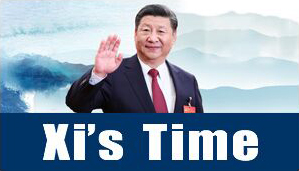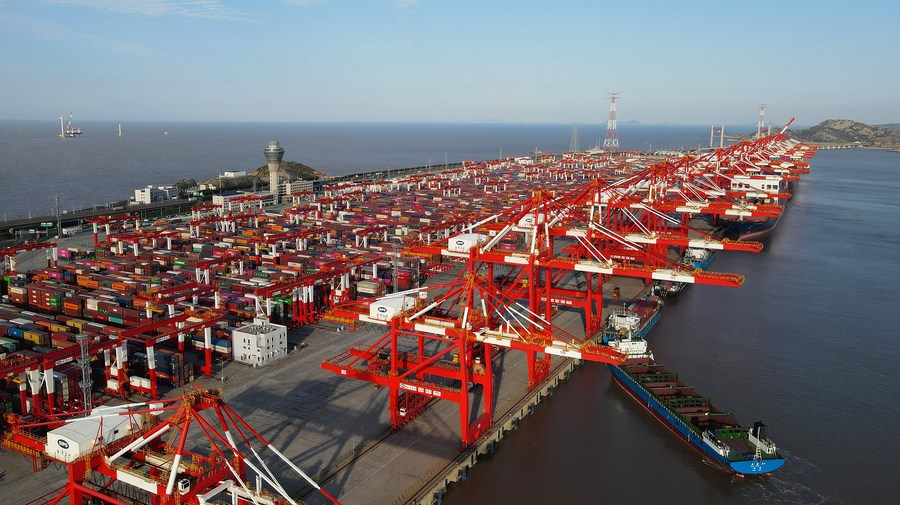
Aerial photo taken on April 6, 2021 shows a view of the automated container terminal of Shanghai's Yangshan Port in east China. (Xinhua/Fang Zhe)
BEIJING, March 12 (Xinhua) -- China's economy captured global attention again after setting a 5.5-percent economic growth target for 2022.
The goal, though below last year's 8.1 percent, is sure to inject confidence and resilience into the global economy riddled with myriad challenges and uncertainties.
Guided by "Xiconomics," the economic philosophy of Chinese President Xi Jinping, China is following a path for high-quality development. China's GDP grew 8.1 percent year on year to 114 trillion yuan (18 trillion U.S. dollars), accounting for 18 percent of the global total.
With a people-centered philosophy of development championed in Xiconomics, the Chinese people are living much better lives thanks to considerable economic growth. Following a development path tailored to its national realities and making notable and substantive progress toward common prosperity for all Chinese people, China has also committed itself to building a better world through common development and win-win cooperation.
MEETING PEOPLE'S NEEDS
"What we now face is the contradiction between unbalanced and inadequate development and the people's ever-growing needs for a better life," Xi said in a report to the 19th National Congress of the Communist Party of China in 2017.
From daily material and cultural needs to the desire for a better life, Xi's economic philosophy examines the needs of the Chinese people from a broader perspective and a higher level.
"The thought, which creatively combines the aspiration of human beings for a better life with the practice of people-oriented development, is of global influence," Australian economist Guo Shengxiang told Xinhua in a recent interview.
In practicing the philosophy, China has been advancing reforms in various areas of public concern, including housing, education and healthcare.
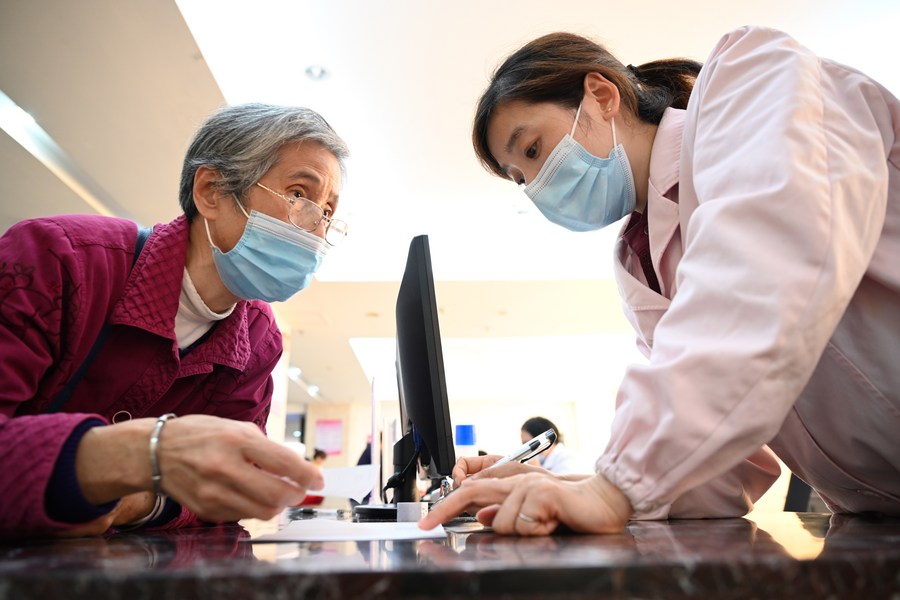
A staff member explains medical insurance policies to a resident at a hospital in Sanming, Fujian Province, Nov. 18, 2020. (Xinhua/Jiang Kehong)
With China's per capita disposable income rising 9.1 percent year on year in nominal terms to 35,128 yuan (5,545 dollars) last year, rapid improvement in Chinese people's lives had been seen in many aspects from dining tables to improved housing conditions, from rising pensions for the elderly to reduced air pollution.
Amid rising global protectionism, it continues to advance high-level opening up and expand imports to meet people's needs for high-quality products and services.
In 2021, China's foreign trade surged to 6.14 trillion dollars, up 21.4 percent year on year and crossing the 6-trillion-dollar threshold for the first time. Exports rose 21.2 percent, while imports went up 21.5 percent.
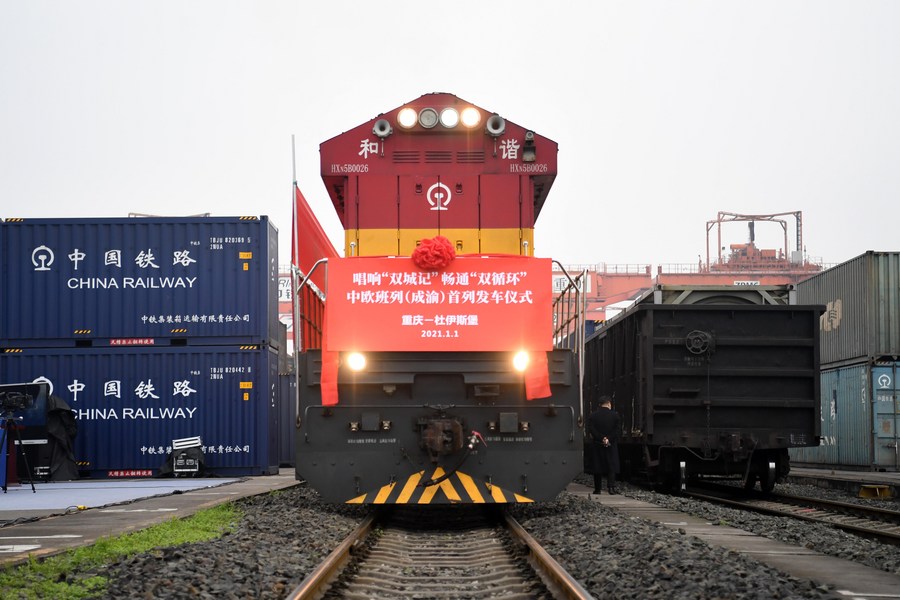
A China-Europe freight train bound for Duisburg of Germany prepares for departure at Tuanjiecun Station in southwest China's Chongqing, Jan. 1, 2021. (Xinhua/Tang Yi)
Contributing over 30 percent to global growth in recent years, China has become a key anchor and driver for the world economy and will continue to be a stabilizer of the global growth.
The 5.5-percent growth goal for 2022, which represents medium-high rate given China's large economic aggregate, can be reached through tapping the internal strength of the world's second largest economy, analysts said.
President Xi's economic thought is full of oriental wisdom and is conducive to the development of the world, noted Honson To, chairman of KPMG China and Asia Pacific.
"It is an advanced thought that suits China's national conditions and the development trend of the world," he said.
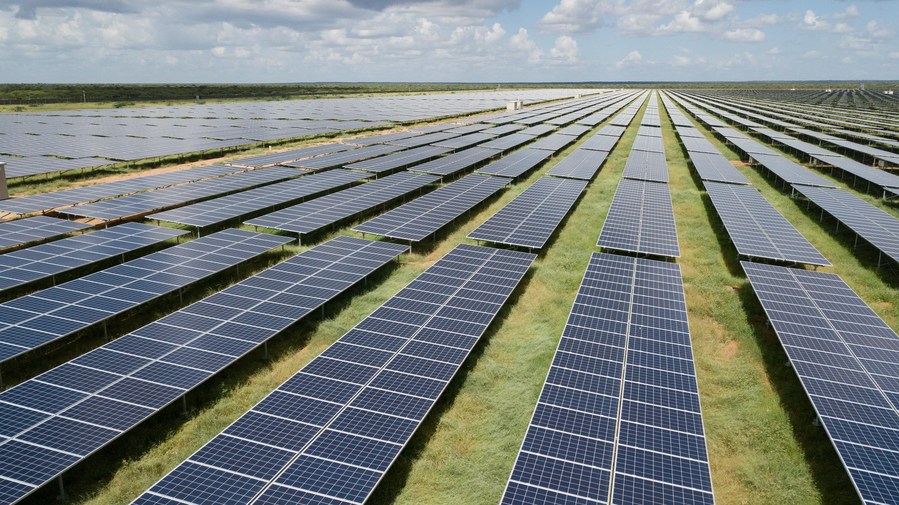
Aerial photo taken on Dec. 13, 2019 shows a 50-megawatt solar farm in Garissa, Kenya. (Xinhua/Xie Han)
SHARED DEVELOPMENT
In the mostly arid, desert-capped northeastern Kenyan county of Garissa, the neat and dense solar panels installed by a Chinese company line up to form an "energy oasis." The project has benefited thousands of families and businesses since 2019.
According to Kenyan President Uhuru Kenyatta, the Chinese-built 50 MW photovoltaic power station, the largest in East Africa, sets Kenya on the path of achieving green energy sufficiency and adds to its rich profile as the center of green energy generation in Africa.
The Garissa solar plant in the African country is just one example. From the China-Laos Railway, the Port of Piraeus, to the Chinese-Belarusian industrial park, similar cooperation programs, carried out under the China-proposed Belt and Road Initiative (BRI) and designed to electrify common development, are flourishing in many parts of the world. Those projects, which feature Xi's vision for development featuring innovative, coordinated, green, open, and shared growth, have brought substantial benefits to local people.
Take the China-funded expanded National Road No. 3, a key transportation artery inaugurated in Cambodia early this month. The 134.8-km road links the capital of Phnom Penh and the southwestern coastal province of Kampot. Cambodian Prime Minister Samdech Techo Hun Sen commented that the road is crucial to boosting economic and tourism development at the inauguration ceremony.
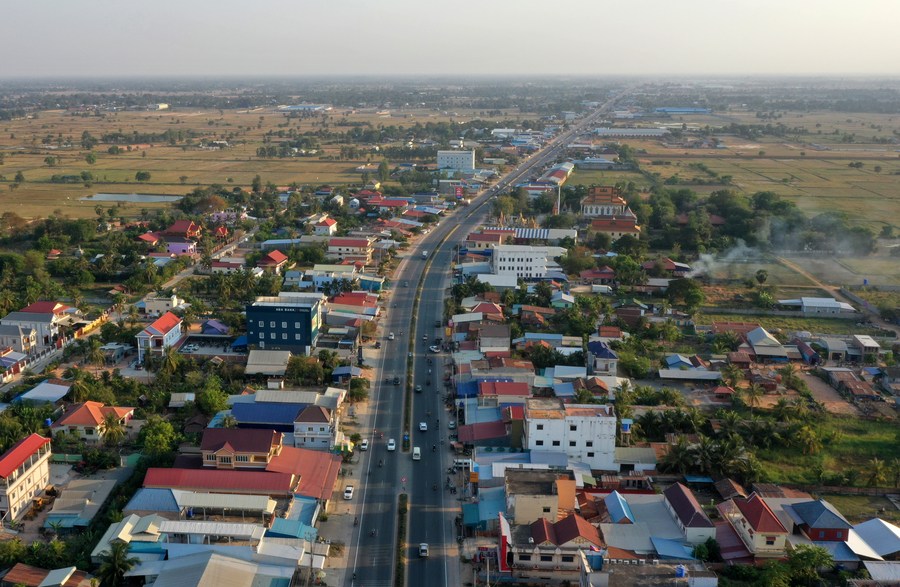
Aerial photo taken on March 1, 2022 shows the National Road No. 3 in Takeo province, Cambodia. (Photo by Ly Lay/Xinhua)
"This is another testament to the fruitful cooperation between Cambodia and China under the frameworks of the comprehensive strategic partnership, the ironclad friendship, and the community with a shared future between the two countries," said Hun Sen.
Ordinary Cambodian people also have high hopes for the road. Thun Sokleng, a 43-year-old farmer in Kampong Speu province, said "I believe that this road will contribute to improving living conditions of the people in the areas along it."
From China's economic growth to the common development of countries worldwide, Xi's economic thought addresses the needs and difficulties of global development through cooperation frameworks such as the BRI and the Global Development Initiative.
Since 2013 when Xi announced the BRI, over 140 countries spanning different regions, cultures and stages of development, as well as more than 30 international organizations, have signed BRI cooperation documents with China.
The BRI cooperation is "not only aimed at promoting economic integration but also solving social problems in the countries taking part in this initiative, particularly issues like raising the level and quality of people's lives," said Alexander Petrov, a professor of St. Petersburg State University.
PURSUING MULTILATERALISM
As the world is faced with stiff and complex problems, Xi said in 2021 that the way out of them is "through upholding multilateralism and building a community with a shared future for mankind."
For years, China has upheld the international system centered on the United Nations and the international order underpinned by international law, observed World Trade Organization trade rules, and practiced true multilateralism against the headwinds of unilateralism and protectionism.
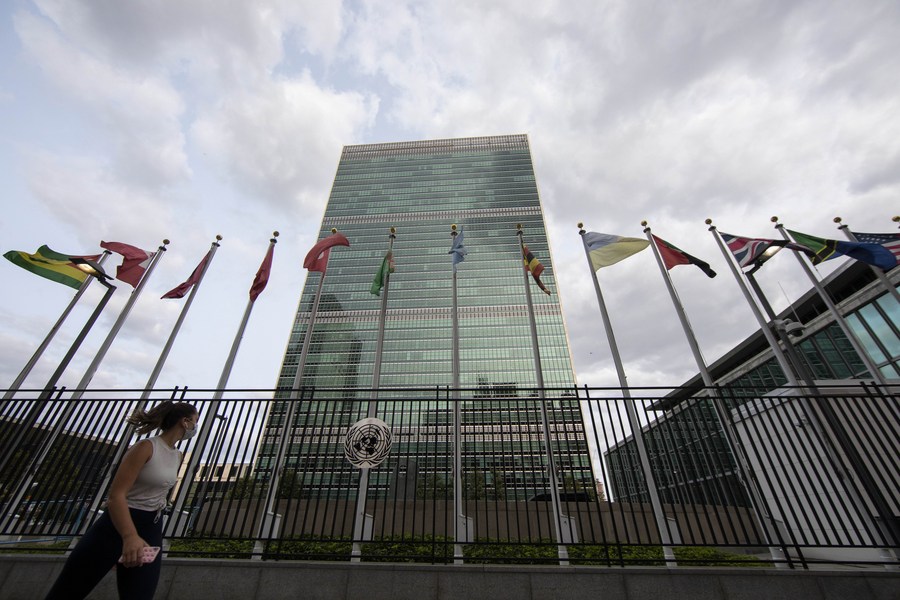
A woman walks past the United Nations headquarters in New York, the United States, Sept. 14, 2020. (Xinhua/Wang Ying)
In promoting mutual respect and equality, China has actively participated in the reform of the global governance system, and worked to make economic globalization more open, inclusive and balanced.
"China does not just talk about multilateralism, but has taken real actions," said Jose Ignacio Martinez Cortes, a researcher at the National Autonomous University of Mexico.
At a time when the global supply of COVID-19 vaccines is tight, China has taken the lead in providing vaccines to developing countries in dire need. China has supplied more than 2.1 billion doses of vaccines to more than 120 countries and international organizations, attesting to the true meaning of multilateralism.
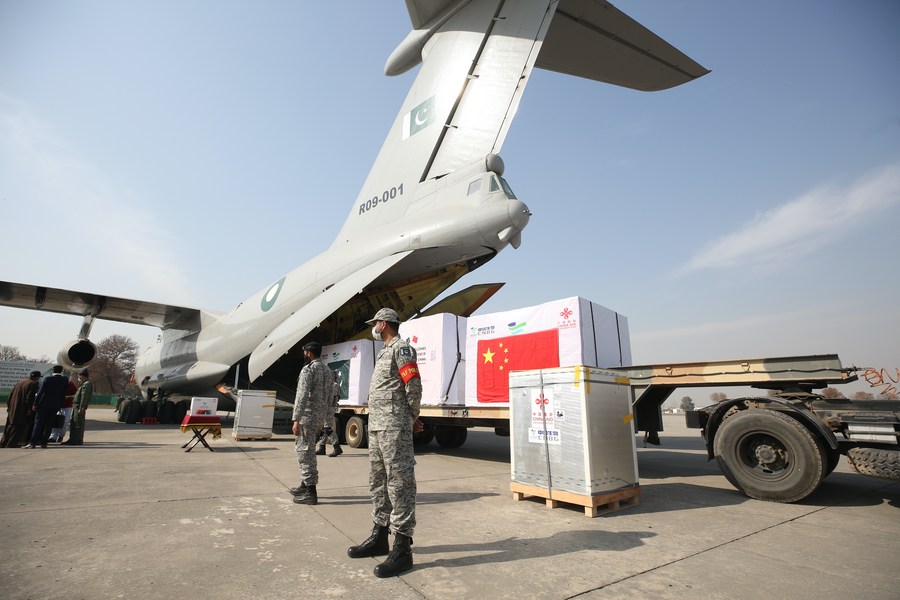
A handover ceremony of a batch of China-donated COVID-19 vaccine is held at Noor Khan Air Base near Islamabad, Pakistan, Feb. 1, 2021. (Xinhua/Liu Tian)
Natee Taweesrifuengfung, president of the Thailand-based Siam Think Tank, said that in the current international situation, China has held high the banner of multilateralism, actively promoted win-win cooperation, vigorously boosted world economic recovery, and has showed its sense of responsibility as a major country.
(Xinhua correspondents Shi Hao in Moscow, Zhu Yubo in Mexico City, Wang Yaguang in Bangkok, Wu Changwei in Phnom Penh also contributed to the story.)■




